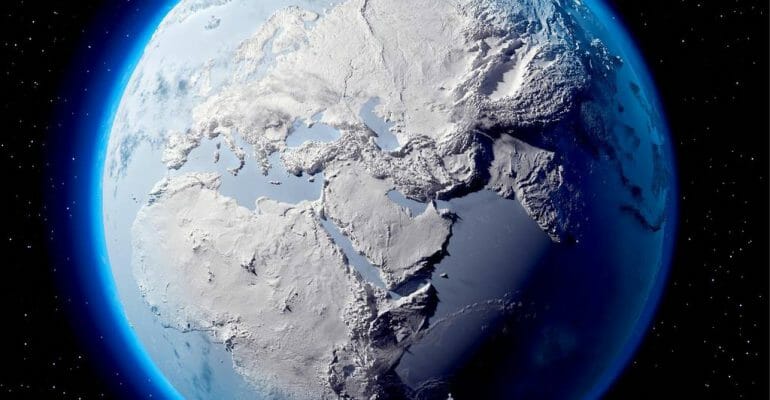How much do you know about the Ice Age?
September 2, 2022 2023-09-18 21:17How much do you know about the Ice Age?
We have all surely seen some films of the cartoon Saga, The Ice Age, but what we do not imagine is that we are still living part of the last Ice Age. Yes, according to an article published on space.com, “The most recent period began about 2.6 million years ago and, in fact, we are still technically in it”.
Source: https://ecoosfera.com/
Inspired by the aforementioned space.com article: How many glaciations has the Earth had and could humans experience one?, we investigate about the ice age, past, present, and future; in addition to understanding how the passage of man has impacted, and impacts, the planet.
To cover this topic, first, it is a must to understand, what is an ice age?
We will use the definition from the space.com article we mentioned, saying that “It is when the Earth has cold temperatures for a long time (millions to tens of millions of years) that leads to ice sheets and glaciers covering large areas of its surface. ”.
Many questions arise when imagining a world covered in ice. In this article, we will try to solve those that are repeated the most, since we find it very interesting to understand where we are and our future impact as citizens of the world.
The first question would be, what time are we currently in?
The article explains that “Right now we are in the most recent ice age’s warm interglacial period, which began about 11,000 years ago.
In an ice age, temperatures will fluctuate between colder and warmer levels. Ice sheets and glaciers melt during warmer phases, which are called interglacials, and expand during colder phases, which are called glacial”.
How many glacial periods are counted so far?
The website www.history.com, in his article Ice Age, he describes that “Scientists have recorded five significant ice ages throughout the Earth’s history: the Huronian (2.4-2.1 billion years ago), Cryogenian (850-635 million years ago), Andean-Saharan (460-430 mya), Karoo (360-260 mya) and Quaternary (2.6 mya-present)”.
What was the temperature during the ice age?
“A team of scientists has nailed down the temperature at the peak of the last ice age, a time known as the Last Glacial Maximum, to about 46 degrees Fahrenheit (ca. 8 °C)”, according to www.cdm.org
Source: https://www.cdm.org/
How long will it be until the next ice age?
The next ice age almost certainly will reach its peak in about 80,000 years, but debate persists about how soon it will begin, with the latest theory being that the human influence on the atmosphere may substantially delay the transition”, states The New York Times.
Will global warming stop the next ice age?
According to an article published by Reuters: “Global warming is likely to disrupt a natural cycle of ice ages and contribute to delaying the onset of the next big freeze until about 100,000 years from now”.
Source: wikipedia.org/wiki/Timeline_of_glaciation
And to the big question: Did man exist during this time?
“Yes, people just like us lived through the ice age. Since our species, Homo sapiens, emerged about 300,000 years ago in Africa, we have spread around the world.
During the ice age, some populations remained in Africa and did not experience the full effects of the cold. Others moved into other parts of the world, including the cold, glacial environments of Europe.
And they weren’t alone. At the beginning of the ice age, there were other species of hominins — a group that includes our immediate ancestors and our closest relatives — throughout Eurasia, like the Neanderthals in Europe and the mysterious Denisovans in Asia. Both of these groups seem to have gone extinct before the end of the ice age.
There are lots of ideas about how our species survived the ice age when our hominin cousins did not. Some think that it has to do with how adaptable we are, and how we used our social and communication skills and tools. And it appears that humans didn’t hunker down during the ice age. Instead, they moved into new areas”, describes from space.com, in its article: How many glaciations has the Earth had and could humans live through one?
Source www.sci.news
And the inevitable question:When will the next ice age happen? – Lorraine Lisiecki
In this explanatory video from TedEd, you will be able to graphically understand the process, taking a walk through the past, present, and future of our planet.
If you are interested in this topic, and want to learn much more, we recommend the following bibliography and articles:
Frozen Earth : The Once and Future Story of Ice Ages
After the Ice Age : The Return of Life to Glaciated North America
People and Culture in Ice Age Americas : New Dimensions in Paleoamerican Archaeology
Ice Age Extinction: Cause and Human Consequences
Discovering the Ice Ages : International Reception and Consequences for a Historical Understanding of Climate
Author : Vanessa D”angelo |























